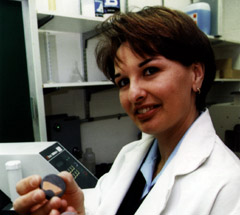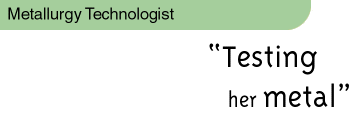 |
A Metallurgy Technologist overseeing quality control, Lisa ensures
that materials used to make metallurgical products meet quality
standards. Three types of tests are performed on various metals:
mechanical tests such as tensile strength, fatigue, and hardness;
chemical tests such as diffraction; and metallography tests such
as X-rays and ultrasounds, to study the structure and properties
of the metals.
Lisa works
for IREQ, a research centre that studies subjects related to electricity.
Although her job involves performing tests, her duties are quite
different from those of a technician working in a manufacturing
plant. "My primary role is to assist researchers in their work,"
she explains. "So I perform mechanical tests, such as breaking
points and fatigue, as well as fault analysis on metals - mainly
aluminium or copper compounds." She also conducts metallography
analyses - observing the microstructure of metals. Once the tests
are completed, Lisa compiles and analyzes the data and writes
a report for the researcher. She also purchases the materials
and equipment she needs for her work, always working within her
budget allotments.
Most of the
time, Lisa works for Hydro-Québec, but sometimes she gets a chance
to work on outside contracts for IREQ clients, including mining
companies.
|
 |


